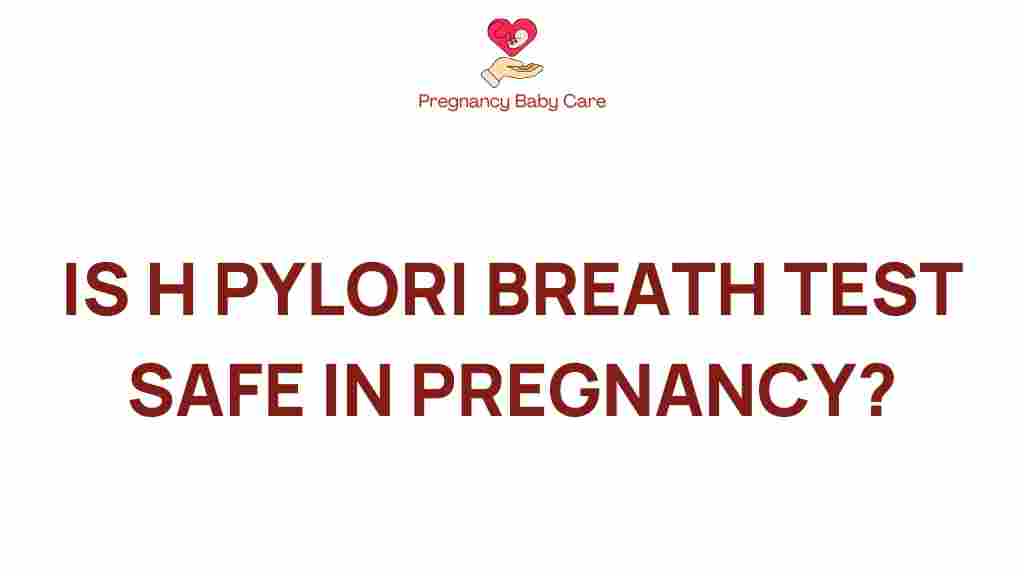Unraveling the Truth: Is the H Pylori Breath Test Safe During Pregnancy?
When it comes to maintaining optimal gastrointestinal health during pregnancy, understanding the implications of bacterial infections such as Helicobacter pylori (H Pylori) is crucial. Pregnant women are often concerned about the safety of various testing procedures, particularly when it involves diagnostic tests like the H Pylori breath test. This article aims to explore the safety of the H Pylori breath test during pregnancy, its impact on maternal health, and the potential complications associated with untreated H Pylori infections.
Understanding H Pylori and Its Implications
H Pylori is a type of bacteria that can infect the stomach lining, leading to various gastrointestinal issues, including gastritis, peptic ulcers, and even stomach cancer. Infection rates are notably high worldwide, and many individuals carry this bacterium without experiencing symptoms. However, in some cases, H Pylori can cause significant health problems, which may become more pronounced during pregnancy due to the body’s changing physiology.
Why Testing for H Pylori is Important During Pregnancy
Detecting and managing H Pylori infections is essential for several reasons:
- Gastrointestinal Health: H Pylori can exacerbate gastrointestinal issues, which are already common during pregnancy due to hormonal changes.
- Maternal Health: Untreated infections may lead to complications such as anemia and nutrient malabsorption, affecting both the mother and the developing fetus.
- Pregnancy Complications: There is some evidence suggesting that H Pylori infections may be linked to pregnancy complications, including preterm birth and low birth weight.
H Pylori Breath Test: What to Expect
The H Pylori breath test is a non-invasive diagnostic procedure that measures the presence of carbon dioxide in the breath after ingesting a special substance containing urea. If H Pylori is present in the stomach, the bacteria will break down the urea, leading to increased levels of carbon dioxide in the breath sample.
Step-by-Step Process of the H Pylori Breath Test
- Preparation: You may be instructed to fast for at least six hours before the test. Avoid certain medications that can affect the test results, such as antibiotics and proton pump inhibitors.
- Ingestion of Urea: The test begins with you swallowing a small amount of urea labeled with a harmless radioactive or non-radioactive isotope.
- Breath Sample Collection: After a specified period, you will exhale into a collection device to capture the breath sample.
- Analysis: The sample is analyzed in a lab to determine the presence of H Pylori based on the carbon dioxide levels.
Is the H Pylori Breath Test Safe During Pregnancy?
Many pregnant women may wonder about the safety of undergoing the H Pylori breath test. The good news is that this test is considered safe for pregnant women. Here’s why:
- Non-Invasive: The breath test does not involve any invasive procedures, making it a low-risk option for pregnant women.
- Minimal Risk of Complications: The substances used in the breath test are generally regarded as safe, and the exposure to radiation, if present, is minimal and typically avoided in pregnant patients.
- Quick and Efficient: The test is quick, usually taking less than an hour, and provides results promptly, allowing for timely treatment if necessary.
Alternatives to the H Pylori Breath Test
In some cases, alternative testing procedures may be used:
- Blood Tests: These can indicate the presence of antibodies against H Pylori, though they may not distinguish between active and past infections.
- Stool Tests: These tests can detect H Pylori antigens but may be less preferred due to the potential for inaccuracies.
Troubleshooting and Considerations
While the H Pylori breath test is generally safe, there are a few considerations to keep in mind:
- Consult Your Doctor: Always discuss with your healthcare provider before undergoing any tests during pregnancy.
- Follow Pre-Test Instructions: Ensure that you follow the preparation guidelines to avoid any false results.
- Monitor Symptoms: If you experience gastrointestinal symptoms such as severe nausea, vomiting, or abdominal pain, inform your healthcare provider immediately.
The Impact of Untreated H Pylori Infections During Pregnancy
Leaving an H Pylori infection untreated can have several implications for both maternal health and the developing fetus:
- Increased Gastrointestinal Distress: Symptoms like bloating, nausea, and abdominal pain may worsen, leading to discomfort.
- Potential Nutritional Deficiencies: An H Pylori infection can affect the absorption of essential nutrients, which are crucial for fetal development.
- Risk of Pregnancy Complications: Research has suggested a potential association between H Pylori infections and complications such as preeclampsia and gestational diabetes.
Conclusion
In conclusion, the H Pylori breath test is a safe and effective method for diagnosing H Pylori infections during pregnancy. Given the potential complications associated with untreated infections, it is vital for pregnant women to be vigilant about their gastrointestinal health. Consulting with healthcare providers about testing procedures and possible treatment options is essential for safeguarding both maternal and fetal health.
For more information on gastrointestinal health during pregnancy, consider visiting the American Pregnancy Association for reliable resources.
Ultimately, understanding the risks and benefits of testing for H Pylori can empower pregnant women to make informed decisions about their health. If you suspect you may have an H Pylori infection, don’t hesitate to reach out to your healthcare provider for guidance.
By staying informed about H Pylori and its implications, you can ensure a healthier pregnancy and contribute to the well-being of your baby.
This article is in the category Health and created by PregnancyBabyCare Team
